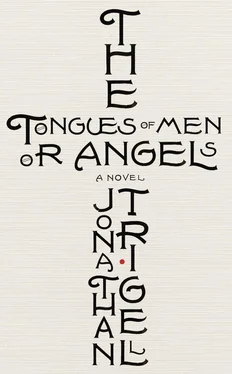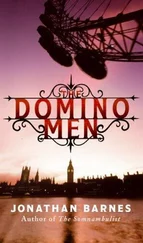For those of The Way, the communal meal is especially symbolic. Saul is familiar with the practice from his time in Damascus, but it is given more meaning in the house of James. For James, though he is the leader and the Messiah’s brother, waits upon the others. It is he who serves the grilled fish — white-fleshed and unspiced, wrapped in leaves — just as Yeshua would have done, had he been there. Among the Nazarenes it is the mightiest man present who takes the role of the wife, the mother, the servant, the slave. The first shall be last and the last shall be first.
James pours the wine and blesses it: ‘We give thanks to You, our Father, for Your holy vine of David, Your servant, our once and future King, soon to be returned.’
And he breaks the bread and passes it: ‘As this broken bread was scattered over the hills and was brought together becoming one, so gather Your people from the ends of the earth into Your Kingdom.’
James doesn’t taste the wine himself, because of his vow. Like Baptizer John, who founded The Way, James drinks no wine or liquor; neither does he eat flesh. And no blade or scissor touches his head. Of all the reverent Jews of Jerusalem, James is hailed among the most pious. But strangely, although James eats no meat, he seems to wish for a return to a time when all men stalked their supper. ‘When men hunted,’ he says, ‘men were equal. The successful shared, because the carcass would quickly spoil in any case. And by doing so each knew that others would share with him in the future. That was how it first was after Eden. When men turned to agriculture they could produce a surplus. And so they could be taxed. And so they could sustain the parasites who don’t toil but only threaten and burden.’
Like Yeshua did, James believes that wealth is an obstacle to piety. They come from a poor family, after all, despite their royal blood. Two doves were sacrificed at Yeshua’s birth, the cheapest, lowliest offering, made only by the humblest of society. But even the penniless must make sacrifice for a first-born boy and they were a dutiful family; all their sons were circumcised on the eighth day after their birth, as God had decreed those of Israel must be. James and Yeshua’s father was a tekton , not a carpenter as such but a builder, a day labourer, one who has insufficient land to farm to support a family. Most houses are made from baked clay, mud and stone in this arid country; there aren’t too many carpenters. Wood is used sparingly. Except by the Romans.
Hours before the Crucifixion
Cephas follows the train of torches across the blackened valley and back into the city. Once inside the walls, on paved surfaces, the boots and spear butts of the Romans resound about confined and quiet streets; sufficiently so that Cephas doesn’t even need to keep the cortège in sight to pursue it. He stays permanently a half-road or an alley back and because of this he sees the faces appear at window slots and heads poke mongoose-like around doorways after the Romans and the high priest’s men have passed by. Even in Jerusalem such a procession of soldiery in the dead of night is a thing unusual. Many of the faces mutter inaudible curses; and the paving in places sparkles with mucus spat at distant Roman backs.
The cohort escorts the prisoner, still encircled in a throng of Temple Guards, to a building in the upper city, which can be nowhere if it is not the house of the high priest. Though to call Annas’s residence a house is to mistake a harrier for a songbird, or a warhorse for a donkey. It is a mansion, and even then a mansion like no other: the bastard offspring of a scared man’s castle and a Latin villa. No doubt trapped with Roman fancies: mosaic floors; marbles; floral frescos of crimson and gold; defrayments of a traitor’s guilt.
Once the high priest’s men-at-arms and the fettered Yeshua are ensconced inside, the cohort of Romans clatters off again, eastward, doubtless returning to the Antonia Fortress. But the gate to the courtyard of the high priest’s house is left open; the whole household is awake, it seems, and various servants, slaves, guards and attendants are gathered there, awaiting instructions or intrigued by events.
Cephas pulls his sword from out of his girdle and submerges it in the shadow-blacked bottom of a stone horse-trough on the street. His wet fingers immediately start to numb, so cold is the night. He pulls up his cowl and slips through the gate into the colonnaded courtyard, trying to be as stealthy as he can, without looking like a man trying to be stealthy.
A group, mostly of female servants, is gathered round a charcoal brazier and Cephas makes his way there to warm his hands and watch and wait.

Yeshua is inside the building, wrists still bound, alone but for the former high priest, Annas, his son-in-law, Kayafa, the current incumbent, and a handful of Temple Guards. The guards look to Annas for their orders — it is clear where real power still lies — though it is Kayafa who questions Yeshua.
‘You attacked the property and business of the Temple. And the authority of the priesthood. Do you deny it?’ Kayafa says.
Kayafa is portly — most priests are: they dine well. You can tell the children of the priests on Jerusalem streets: little fat princelings who eat meat every night when most boys taste it just a few times a year.
‘What authority of the priesthood?’ says Yeshua. ‘You are like one of your own grand Sadducee tombs: fine and whitewashed on the outside, but inside filled with dead men’s bones and all kinds of filth. So it is with you: the exterior of honest men, but brim-full of hypocrisy and crimes of collaboration.’
One of the guards strikes him then, a blow to the jaw. ‘Is that how you answer the high priest?’
Yeshua raises his head again, from where it was knocked low by the blow and looks at the man, who twitches a little from that look alone. Yeshua moves his jaw, as if in test that it is unbroken; his dense beard ripples as he does so, saltbush in a desert wind.
‘If I spoke amiss,’ Yeshua says, ‘state it in the evidence. Why strike me? I have spoken openly to the world. I have taught where all people congregate. Why question me? Ask my hearers what I told them. I have said nothing in secret.’
‘We have witnesses who say that you have threatened to destroy the Temple,’ Kayafa says.
‘Not the Temple,’ says Yeshua, ‘but your rule of it, you truckler puppet, you toad-eater. You wax fat from supping with Rome and oppressing the poor ones. Your obeisance to the heathen is ungodly. You aren’t worthy of your office.’
The guard strikes Yeshua again, and smirks at it this time, pleased to have overcome his fear.

Out in the courtyard, a servant girl recognizes Cephas.
‘You’re one of his disciples,’ she says. ‘I saw you walking with him on the day the crowds cheered him into Jerusalem. You’re with the Galilean, aren’t you?’
‘You are mistaken,’ Cephas says. ‘I don’t know who you mean.’

‘Tell us,’ Annas says, ‘are you the King?’
‘If I say so, you won’t believe me. And if I deny it, you still won’t release me. So I’ll tell you the truth anyway. Yes, I am Israel’s King and you will yet see the coming of God’s Kingdom, just as Daniel prophesied.’

The servant girl stares at Cephas and insists, ‘It was you I saw. You are a head taller than the rest, I would hardly forget. And you speak like one of them too. You’re from Galilee. You are definitely with him.’
Читать дальше













